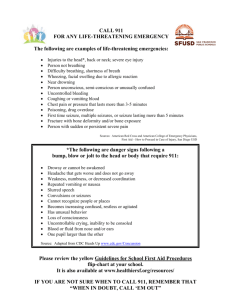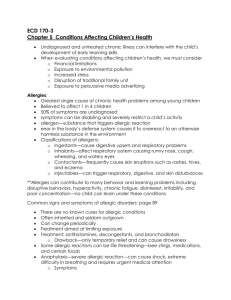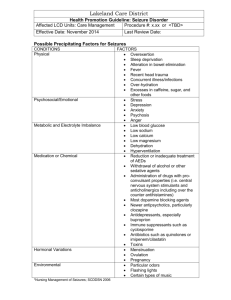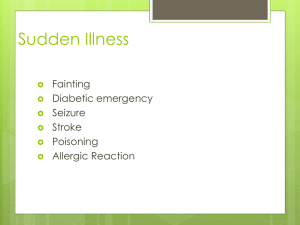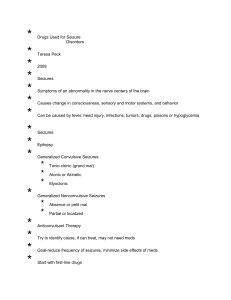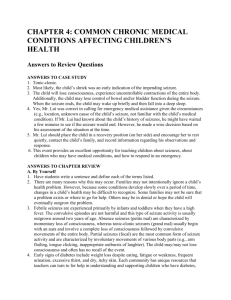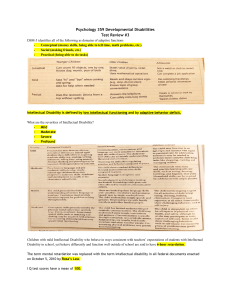Helping Students with Health Facts about Seizures Some Facts about Chronic Health
advertisement
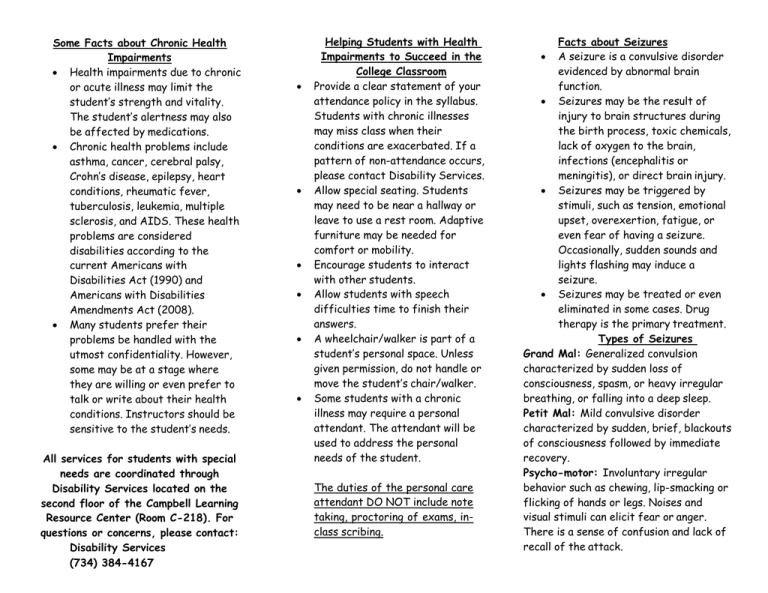
Some Facts about Chronic Health Impairments Health impairments due to chronic or acute illness may limit the student’s strength and vitality. The student’s alertness may also be affected by medications. Chronic health problems include asthma, cancer, cerebral palsy, Crohn’s disease, epilepsy, heart conditions, rheumatic fever, tuberculosis, leukemia, multiple sclerosis, and AIDS. These health problems are considered disabilities according to the current Americans with Disabilities Act (1990) and Americans with Disabilities Amendments Act (2008). Many students prefer their problems be handled with the utmost confidentiality. However, some may be at a stage where they are willing or even prefer to talk or write about their health conditions. Instructors should be sensitive to the student’s needs. All services for students with special needs are coordinated through Disability Services located on the second floor of the Campbell Learning Resource Center (Room C-218). For questions or concerns, please contact: Disability Services (734) 384-4167 Helping Students with Health Impairments to Succeed in the College Classroom Provide a clear statement of your attendance policy in the syllabus. Students with chronic illnesses may miss class when their conditions are exacerbated. If a pattern of non-attendance occurs, please contact Disability Services. Allow special seating. Students may need to be near a hallway or leave to use a rest room. Adaptive furniture may be needed for comfort or mobility. Encourage students to interact with other students. Allow students with speech difficulties time to finish their answers. A wheelchair/walker is part of a student’s personal space. Unless given permission, do not handle or move the student’s chair/walker. Some students with a chronic illness may require a personal attendant. The attendant will be used to address the personal needs of the student. The duties of the personal care attendant DO NOT include note taking, proctoring of exams, inclass scribing. Facts about Seizures A seizure is a convulsive disorder evidenced by abnormal brain function. Seizures may be the result of injury to brain structures during the birth process, toxic chemicals, lack of oxygen to the brain, infections (encephalitis or meningitis), or direct brain injury. Seizures may be triggered by stimuli, such as tension, emotional upset, overexertion, fatigue, or even fear of having a seizure. Occasionally, sudden sounds and lights flashing may induce a seizure. Seizures may be treated or even eliminated in some cases. Drug therapy is the primary treatment. Types of Seizures Grand Mal: Generalized convulsion characterized by sudden loss of consciousness, spasm, or heavy irregular breathing, or falling into a deep sleep. Petit Mal: Mild convulsive disorder characterized by sudden, brief, blackouts of consciousness followed by immediate recovery. Psycho-motor: Involuntary irregular behavior such as chewing, lip-smacking or flicking of hands or legs. Noises and visual stimuli can elicit fear or anger. There is a sense of confusion and lack of recall of the attack. Responding to Persons Experiencing Seizures Seizures are caused by electrical activity in the brain, which usually lasts from 2 seconds to 2 minutes in duration. Symptoms can include passing out, rigidity, repetitive jerking movements of body, speech difficulties, and eye rolling or fluttering. Injury from falling is the most prevalent consequence of a seizure. The instructor’s primary responsibility when dealing with a person with seizure-like symptoms is to make sure they are safe and minimize trauma to the others present. 1. Stay calm. Remove furniture and other articles that may pose injury to student. Help the person to a reclining or side-lying position if possible. Remove eyeglasses if possible. 2. Call 9-1-1. (Do not contact the Nursing Department. They are on campus in capacity of instructors not to administer medical care). 3. Call College Security at EXT. 6007 or dial 0. Ask others who are present to dismiss from the area temporarily until the situation has been handled. 4. Check for medical bracelet if possible so that medical personnel can be informed of listed condition when they arrive. 5. If you have received information that the student has a registered disability and it is possible, Contact Disability Services at EXT. 4167. Counselors can pull the student’s file to see if there is additional needed information. 6. Allow the seizure to run its course. Do not restrain the student. 7. Do not put anything into the student’s mouth. A seizing student cannot swallow their tongue. 8. When seizing stops, place the student on his/her side. It is not uncommon for someone who has a seizure to vomit. This will prevent the student from choking. Let the student rest until he or she regains consciousness. 9. When the student regains consciousness, he/she will likely be disoriented. Reassure the student that help is on the way. Do not give the student anything to eat or drink. When First Responders Arrive: Only the MCCC professionals should give out information. Protect the confidentiality of student. The First Responders will decide the level of care recommended. They may recommend transporting of the student to the hospital. Expect when conscious, some students will refuse transport due to expense or possibility of losing driver’s license due to hospital mandate to report. It is the student’s right to refuse medical care despite what any MCCC professional might believe is in the best interest of the student. After the Emergency personnel leave, invite other students to return to classroom. Do not discuss the details of the incident, but be open to encourage/calm students who may appear distressed over the incident. Follow up by completing the MCCC Risk Management Incident Report. Report forms can be obtained through MCCC Security or Division Offices. Helping Students with HEALTH IMPAIRMENTS To Succeed at MONROE COUNTY COMMUNITY COLLEGE 1555 RAISINVILLE RD. MONROE MI 48161
